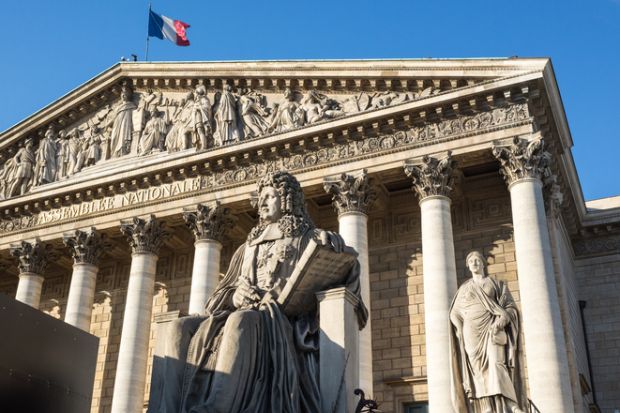For France’s education minister, Jean-Michel Blanquer, US universities are central to the peril in which French academic freedom finds itself. Why? Because they are the incubators of the sort of scholarship – around women’s rights, racism, the consequences of colonialism and social inequalities – that underlies the alleged scourge of “Islamo-leftism”.
That the academic frameworks underlying such disciplines were first drafted by classical French thinkers, such as Michel Foucault, Frantz Fanon and Simone de Beauvoir, was evidently lost on the minister. But then nothing about the government’s thinking on this non-issue is based in reality.
Islamo-leftism is a chimera supposedly born – as science minister Frédérique Vidal put it in a recent interview – of an alliance between Mao Zedong and Ayatollah Khomeini. And you don’t need to take my word for it: just read the CNRS.fr/fr/l-islamogauchisme-nest-pas-une-realite-scientifique">statement issued by the National Centre for Scientific Research (CNRS), France’s highest research institution, which says the concept “does not correspond to any scientific reality”.
It is a term that recalls the eerie spectre of antisemitic campaigns against “Judeo-Bolshevism” in Europe before the Second World War: the idea that Jews had taken control of the media and politics to propagate socialism and communism. In this case, academics researching issues related to equality are supposedly being directed, consciously or otherwise, by the puppet masters of Islamic extremism.
For academics, however, the actual threat to their freedom might be the French government itself. The hysteria over Islamo-leftism amounts to a pandering to far-right sentiments ahead of April 2022’s presidential election, as Emmanuel Macron pursues votes from areas that favoured Marine Le Pen’s National Rally (formerly the National Front) in the previous election.
In fact, denying the existence of racial, gender and class inequalities has become a classic election strategy by both right- and left-wing parties in France to deflect criticism for entrenched social and economic inequalities. Rather than their own policies, they suggest, the problem is the result of immigrants’ failure to assimilate or to work hard enough.
However, the Islamo-leftism controversy breaks new ground in the establishment’s blame deflection, with the culprits now identified as academics and scientific research as an institution. This narrative is, of course, part of a global anti-university trend initiated by Donald Trump, which depicts researchers in the social sciences, arts and humanities as sowing the seeds of social chaos. Yet in the UK and North America, it has mainly been private groups pushing the agenda (the far-right group Turning Point created an online “watch list” of “progressive” US academics, for instance). We are now talking about a government taking an official stance on the matter.
“Cancel culture”, long decried by these same groups around the globe as a modern plague, has now become a tool in the hands of the French government to silence its opponents. Worse, by opposing the critique of social and economic realities born of – in Macron’s own words – historical crimes against humanity, the government plays to an idea of France as a white, Christian, male-dominated nation, to be defended against the barbarians shooting flaming arrows from bows strung with (French-made) social theories.
Part of the problem is the historical disconnect between policies and research in France, borne out by the country’s lack of a thinktank culture via which academic expertise can flow into government policy. It is no wonder that, for decades, French researchers have left for countries where their work is more valued.
The US, Canada, the UK and the Nordic nations may have their flaws, but at least some of them have equality laws that enshrine ethnicity and gender as protected characteristics. And all of them have government structures (if not always administrations) that are open to facts and figures that hold ideologies and power to account.
Research around marginalised demographics stemmed from the advent of feminism, the civil rights movements and the fights against apartheid, antisemitism and imperialism. The French government is saying that this is now a threat to society. I shudder to think where this may end, but it does at least reassure me that I made the right decision when I joined all those émigrés and left France for the UK.
William Barylo is a research fellow at the University of Warwick.
Register to continue
Why register?
- Registration is free and only takes a moment
- Once registered, you can read 3 articles a month
- Sign up for our newsletter
Subscribe
Or subscribe for unlimited access to:
- Unlimited access to news, views, insights & reviews
- Digital editions
- Digital access to THE’s university and college rankings analysis
Already registered or a current subscriber? Login








